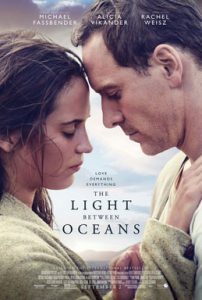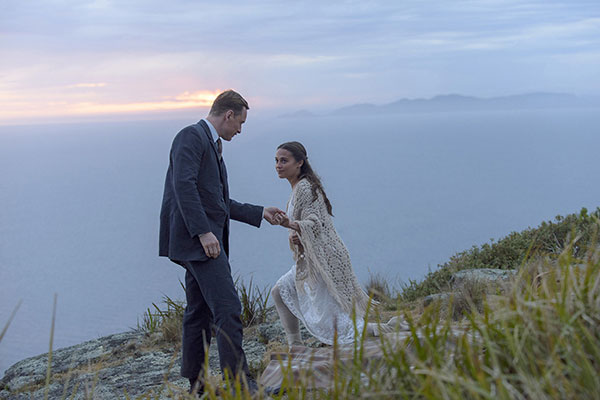Film Review: “The Light Between Oceans”
Written by: Christopher Llewellyn Reed | September 2nd, 2016

The Light Between Oceans (Derek Cianfrance, 2016) 2½ out of 4 stars
Shot by Australian cinematographer Adam Arkapaw (Macbeth), The Light Between Oceans is a visually sumptuous film, where the land and the sea (particularly the latter) are dramatis personae unto themselves, embracing and repelling the human characters in equal measure. In its most literal sense, the title refers to a lighthouse on the fictional island of Janus, which sits at the spot, off the Southwest coast of Australia, where the Indian Ocean and Great Southern Ocean meet. The beacon that shines from the top of the tower is supposed to guide wayward sailors to safety, yet here it blinds as much as it illuminates, leading the protagonists not aright, but astray. That dual property of light is a perfect metaphor for the moral dilemma at the center of the film, and beautifully rendered in Derek Cianfrance’s cinematic adaptation of M.L. Stedman’s eponymous 2012 bestselling debut novel.
Unfortunately, both in book and movie, this visual metaphor, in both set-up and denouement, is the strongest aspect of the story. Acts I and III serve the narrative well, while the middle is a muddle. Though Cianfrance (The Place Beyond the Pines) has a fine way with both actors and camera, and is not afraid to change details in the source text, he remains too enamored of the central melodrama for my taste. Life is full of tragedy: bad things happen to good people, and good people do bad things. Yet the mere act of placing tragic events at the center of one’s story does not necessarily an effective dramatic tragedy make. Certainly, to go by the many sounds of weeping at the press screening I attended, there are many who will disagree, and that is fair. If calculated catharsis does not annoy you, then The Light Between Oceans could be the late summer movie for you.

The time is just after the end of World War I. Tom Sherburne (Michael Fassbender, Steve Jobs) is back from the trenches, looking to escape the horrors of civilization. He applies for a posting on Janus, and quickly heads offshore. Not so quickly that he doesn’t catch the eye of young Isabel Graysmark (Alicia Vikander, Ex Machina), however. A few shared moments lead to a correspondence that slowly awakens Sherburne’s long-suppressed emotions. Most of the other marriageable men are dead, and Sherburne seems a steady sort, so why not marry, think Isabel and her parents, even if it means moving to a deserted island. Which is what they do, creating a lovely idyll where love leads to its natural outcome. Sadly, a child of their union is not meant to be, and they grow desperate. Until, one day, after yet another miscarriage, a rowboat washes ashore, with a cargo of one dead man and one very live baby. What happens next will define the future lives of not only Tom, Isabel and the as-yet-unnamed child, but of folks on the mainland, as well. Remember, good people do, indeed, do bad things, even with the best of intentions.
Both Fassbender and Vikander inhabit their roles with every fiber of their beings, delivering powerful performances as tortured souls. True, neither of them seem capable of speaking in the same Aussie accent as the townspeople – nor does Rachel Weisz (The Lobster), the third leg of the dramatic troika, though she is otherwise similarly strong – but we follow their travails in painful empathy, nonetheless. Despite all of these individually vivid elements, however, at some point it just becomes a little too much, piling misfortune upon catastrophe until we beg for any sign of the light, however blinding. Every sad story needs some form of reprieve, otherwise there is no contrast to explain our despondency at what might have been, just as the best comedies include the occasional doleful note. When the genuinely moving ending arrives – which, dear reader, did make this apparent misanthrope shed a mild tear – the relief we feel is as much for the principal players as for our own weary souls, finally freed from the tyranny of histrionic grief.

